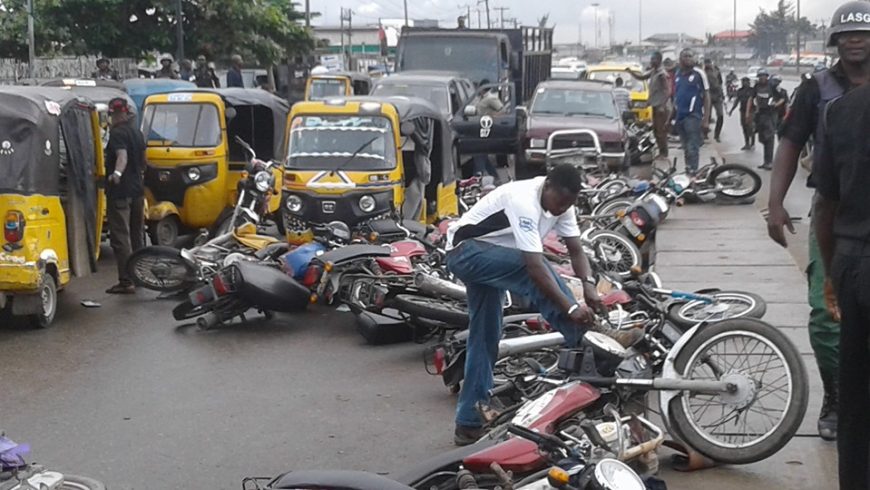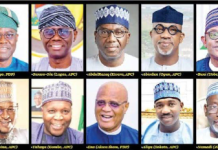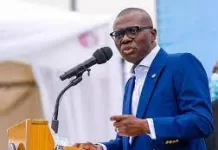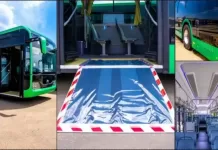Why Okoda, keke NAPEP have to leave Lagos roads now-Sanwo-Olu
..As mixed reactions trail ban
By Anthony Okafor
Controversy has continued to trail the planned ban on the activities of commercial motorcyclists, popularly called “Okada” and operators of tricycles often referred to as “keke NAPEP,” in 15 local government areas, LGAs, out of 57 councils in Lagos State. The ban, considered a pilot scheme, is slated to take effect from February 1, 2020.
On assumption of office, Lagos State Governor, Mr. Babajide Sanwo-Olu, signed his first Executive Order to address the issue of traffic control and management, fixing of potholes on the roads, sanitation as well as cleaning of drainages in the state.
In line with one of the pillars of T.H.E.M.E.S agenda of Sanwo-Olu’s administration, which is; Traffic Management and Transportation, he has left no one in doubt of his commitment towards sanitising the transportation sector in the state.
Sanwo-Olu administration, since assumption of office in May 29th, 2019, has been under intense pressure to find a lasting solution to “okada” menace in particular whose activities have led to many preventable deaths and maiming of others.
Therefore, the state government, late last year, vowed to embark on full enforcement of the 2018 Lagos Reformed Traffic Law, inorder to restore sanity in the state. It had to delay the announcement of total enforcement till last Monday, after the State Security Council meeting, chaired by Governor Sanwo-Olu, held at the Lagos House, Alausa, Ikeja.
Lagos State Government and the State Security Council decided that the security and safety of lives of residents are paramount, hence, the decision.
Sanwo-Olu, speaking with the state House Correspondents, on Monday, explained that the violation of traffic laws by commercial motorcyclists, was unacceptable, thereby, necessitating the enforcement of the state Traffic Law 2018 to pave the way for the implementation of the present administration’s transportation project.
Kokori to Buhari: Be vigilante, watchful, your government is being run by a cabal
Finally, announcing the ban, in response to yearnings of concerned residents on the need to take a pragmatic position on the activities, the state Commissioner for Information and Strategy, Mr. Gbenga Omotoso, Frederic Oladeinde and Moyosore Onigbanjo, Commissioners for Transportation, Attorney-General and Justice, respectively, at a joint press briefing, proscribed their operations in six LGAs, and nine Local Council Development Areas, LCDAs, as well as 10 major highways across the state with effect from February 1, 2020.
The ban and enforcement also affect the newly introduced “Opay ride, Gokada ride” and other similar commercial motorcycles. Government did not however, specify if private powerbike owners are included and only courier service companies would be exempt.
According to Omotoso, the measures were taken by the government in response to “scary figures” of fatal accidents recorded from operations of Okada and tricycles, saying it had resulted in preventable loss of lives, “their impermissible movements on restricted highways has also contributed to traffic jams.”
His words: “After a robust assessment of the debate on what has been widely referred to as the motorcycle (Okada) and tricycle (Keke) menace, the state government and the State Security Council have decided that the security and safety of lives of residents are paramount.
[News] Centralized security architecture has failed Nigerians – Senate
“The figures are scary. From 2016 to 2019, there were over 10,000 accidents recorded at the General Hospitals alone. This number excludes unreported cases and those recorded by other hospitals. The total number of deaths from reported cases is over 600 as at date.
“The rate of crimes aided by Okada) and Keke keeps rising. They are also used as getaway means by criminals.”
Thus, law enforcement agents have been directed that with effect from February 1, 2020 should commence Zero Tolerance enforcement for Okada and tricycles in (on) the listed local governments, highways and bridges, stressing that all offenders and violators would be dealt with in accordance with the law.
Speaking on the alternatives, Oladeinde, said the state government would be rolling out some buses in areas affected by the ban to cushion the effect.
“We have put this into consideration as government will be rolling out buses in the next couple of days. We want to assure that people will not be left to suffer unnecessary. What we are doing is to ensure safety of lives of residents which is paramount,” he said.
The following are the LGAs and LCDAs where they have been banned: Apapa LGA, Apapa Iganmu LCDA, Lagos Mainland LGA, Yaba LCDA, Surulere LGA, Itire-Ikate LCDA, and Coker-Aguda LCDA.
Others are Ikeja LGA, Onigbongbo, LCDA, Ojodu LCDA, Eti-Osa LGA, Ikoyi-Obalende LCDA, and Iru-Victoria Island LCDA, Lagos Island LGA and Lagos Island East LCDA.
While their operations are restricted on the following highways and bridges: Lagos-Ibadan Expressway, Apapa-Oshodi Expressway, Oworonshoki-Oshodi Expressway, Lagos-Ikorodu Expressway, Lagos-Abeokuta Expressway, Eti-Osa/Lekki-Epe Expressway, Lagos-Badagry Expressway, Funsho Williams Avenue, Agege Motor Road, Eti-Osa Lekki Coastal Road.
The bridges are: Apapa-Iganmu, Apapa-Ijora Link Bridge, Liverpool Bridge, Apapa, Mile 2 Bridge-Loop, Amuwo-Odofin, Okota (cele)/Ijesha Link Bridge,Iyana- Ipaja, Dopemu noth in Agege, Airport/Ikeja, Agege Motor Road/Oshodi Loop, Oshodi, Mushin/Isolo Link Bridge, Dorman Long Bridge, Ojuelegba Bridge, National Stadium Flyover, Apakun/Apapa-Oshodi Bridge Network, Ikorodu Road/Anthony Clover leaf Bridge, Trade Fair Flyover, Festac/Amuwo-Odofin Link Bridge, Flyover Bridges along Alhaji Masha Road, Ojota Clover leaf Bridge,Ogudu Bridge, Third Mainland Bridge, Maryland flyover, Ikeja General Hospital Flyover Bridge, Kodesoh Bridge, Oba Akran, Ikeja, Opebi Link Bridge, Sheraton-Opebi Bridge, Jibowu/Yaba flyover Bridge, Carter Bridge, Lagos, Bariga-Ifako Bridge, Apapa-Oshodi Expressway/Alapere Bridge, Bariga/Oworonsoki Bridge, Apapa-Oshodi Expressway/Gbagada U-Turn, Apapa-Oshodi Expressway, Third Mainland/Oworonsoki Bridge, Eko Bridge, Apongbon flyover Bridge, Cowry Bridge (Officers Mess), Mcwen Bridge (Bonny Camp), Marina/Ikoyi Bridge, Ikoyi/Obalende Bridge.
Lamenting the era of indecency exhibited by motorcycle and tricycle riders, the commissioner stated that their consistent and brazen disregard for the law, in addition to drug abuse by many should be a matter of concern for residents.
“Okada is being used to escape after robberies. Besides, the influx into the state of many riders without traceable addresses and valid means of identification, in spite of the provision for a rider’s permit, remains a huge security and safety threat to residents. We cannot fold our arms and watch them disrupt the peace of the State,” Omotoso said.
Beside, the sheer size of the industry, the level of indiscipline, security concerns and, particularly, the level of fatalities being recorded daily, demanded appropriate and very serious sanctions. The government, in line with its T.H.E.M.E.S agenda, is however, addressing the challenge decisively.”
It has become evident that traffic crimes and robbery are mostly as a result of the menace of Okada riders and street hawkers. They flouts, not only traffic law but also all extant traffic rules and regulation with flagrant disregard and impunity.
Several efforts to check the excesses of the indiscipline riders and put them at bay, failed as the number kept increasing daily even with high number of arrests and court penalties.
It’s instructive to note that on August 30th, 2019, Lagos State Environment Sanitation and Special Offenses Taskforce on a Friday, intercepted a truck laden with 48 motorcycles and 123 men coming from Jigawa State.
The truck was seized, following a tip off by members of the public who raised security concern about the manner with which the occupants of the truck conducted themselves.
After a security alert from the public, Chairman of Lagos State Taskforce on Environmental and Special Offences Unit, Chief Superintendent of Police, CSP, Mr. Yinka Egbeyemi, accosted the truck in the wee hours of the day. His team swiftly responded to the information, which led to the seizure of the truck and its occupants at Agege area of Lagos. Subsequently, in a swift response to the alert, it eventually intercepted the truck which carried no fewer than 123 men and 48 motorcycles.
After interrogation, most of the occupants were said to be coming from Jigawa State, with 48 of them claiming to own seized motorcycles. The rest of them said they came to Lagos in search of greener pasture.”
The Lagos Police Command set up a fact-finding panel to profile the detained occupants of the truck, with nothing incriminating found on them apart from the motorcycles.
One of the detained occupants, Shuaibu Haruna, said he left Jigawa State to work in Lagos with his motorcycle. He claimed to have a wife and a son, but said he needed to double his income to cater for his family.
Another occupant, Mohammed Ibrahim, said he left his base in the Northern part of the country to keep himself busy after finishing his farm work. He said he was going to Badagry to join his brother.
According to Egbeyemi, “These operators, no doubt have been a sort of menace as their public nuisances and criminal activities at any time of the day is becoming alarming particularly, at Apapa and its environs.”
The chairman stressed that while some of them harassed innocent members of the public at various bus-stops around Coconut, Wharf, Tincan-Island and Apapa GRA, others engaged in all sorts of criminal acts by dispossessing their passengers of valuables and also robbing innocent motorists during traffic.
“But administration of Sanwo-Olu will not allow a few notorious elements to cause a breakdown in law and order and upset the peace that the state has enjoyed over the years,” he said.
While supporting the ban, Mr. Segun Johnson, a motorist in Festac Town and victim of okada accident, narrated, “I was trying to negotiate a turn, while signaling with my blinker. Unfortunately the motorcycle rider was going too fast, and did not know his road signs. The result was an accident which damaged both my car and motorcycle, and injured both rider and passenger. Before I got out of the car and offer assistance to the injured, about 50 riders appeared out of nowhere and descended on me, screaming for my blood and chanting Islamic slogans. Onlookers stared haplessly, but I managed to escape from the scene.”
Mrs. Grace Ugochukwu narrated an experience by her friend, “In December 2019, a woman was making a turn into her compound, when a crazy okada rider came out of nowhere and ran into her car. When she came out of her car to assess the damage, a mob of okada riders attacked her and tore her clothes. By the time help came from people in the area, her purse and phone had been stolen and her children watched in horror as their mother was beaten and fondled by okada hooligans. This is becoming a regular occurrence in and around Festac area and other parts of the state.
“Who are these okada riders? Where do they come from? Why are there so many of them? How come we cannot identify them? Where do they sleep at night? These are questions we have to ask ourselves, and appeal to our government and police to answer. In the last one year the influx of northerners parading as commercial bike riders, trash packers, vendors of tomato, fruits and vegetables, shoemakers, tinkers (garuwa paper), and other petty items vendors is alarming. These men come to Lagos in droves and settle wherever with no identification, no address, no documentation. Nobody knows their real names; where they come from, or how to monitor them. They parade around as cart pushers and steal drainage covers and man-hole covers, leaving gaping holes in the road.
“They steal generators and air conditioning units from houses and flats, and under the guise of bike riders, they rob innocent men and women at night or in the early mornings. You cannot catch them because they have no identity and no one seems to know them.
“What you may find most alarming is this; they know you. They know where you live and how many children you have, but you know nothing about them. Most of them are not even Nigerians! They come from Niger and Chad and sleep outside your streets or roam around at night looking for what to steal. I overheard a group of them joking that if any of their members is killed, they will spill blood before anyone knows what is happening. They did not know that I understand Hausa, so they spoke freely. I support the government on the ban,” she said.
Mr. Charles Egu, a worker around Apapa said, “It’s high time we check this massive invasion and force these people to identify themselves. These men all carry weapons and are just waiting for a signal to use them. Before my very eyes a policeman at Mile 2 tried to impound a motorcycle for parking on the expressway, and a dozen of them drew daggers and threatened to stab him and his colleagues.
This happened on a Monday at Mile 2. We are in danger and this ban on Okoda will check these excesses.”
Mixed reactions
When iBrandTV spoke to some affected operators and residents in the state, most lamented the decision by the government, saying that it remains to be seen how such ban could be enforced without alternatives, adding that it would have negative security and economic implications.
Mr. Akeem Aliu, an operator, within the Ikotun axis expressed disappointment with the decision, saying that his means of livelihood was about to be taken away from him.
“I don’t think this is right because many of us depend on this Okada riding to provide food for our families. And if we are not allowed to operate within these areas as announced by the state government, then we are doomed.”
Similarly, Abel Olarewanju, a tricycle operator, described the development as a bitter pill to swallow, saying that as much as it would affect their daily income, urging government to have a second look at the situation.
For Anthony Wale, an Oride rider, condemned government action, saying that it was unfair to place a ban on them after investing so much in the business. I think what the government should do is to regularize the operation.
“I still don’t understand why the Lagos State Government would enforce such law that will now restrict us from plying some major roads in the state.”
“Governor Sanwo-Olu should have to rethink his decision of enforcing a law that could probably increase the crime rate in the state because, with this law, many of us will be arrested”- Abudullai Ahmed said.
“I must commend the Lagos State Government for taking this bold step in enforcing the new law that bans Okada rider and other tricycles from plying certain routes in the state. However, have they created alternative jobs for those people that will be affected? See my brother, I just hope this new law won’t backfire on Lagosians,” Dipo Ibikun said.
“The truth is, the Lagos State Government has not done well with the enforcement of the new law that bans Okada riders from six local gov
ernment areas. Besides, if the ban is to reduce the rate of accidents in the state, will that totally curb some of the road accident we witness every day? Let us wait till February 1st to see what awaits us the Okada riders,” Hakeem, Ojodu.
“I am really against the ban of Okada riders from the six local government areas by the Lagos State government. This will further increase the rate of crime in the state,” Ahmed, Ojodu






